Milk Teeth (Baby Teeth) are as important as permanent teeth. Parents think milk teeth are going to fall out, so taking care of them is not important. But that is not the case. The milk teeth are as important as the permanent teeth. The care for the milk teeth is almost the same as it is for the permanent teeth.
In this article
1. There is only one set of milk teeth
Many times, parents ask if their child has lost a milk tooth early due to either a cavity or trauma and if the child will get the milk tooth again. The answer is NO. The permanent tooth will only replace the milk tooth when the time comes. There is only one set of milk teeth and one set of permanent teeth.
So, make sure the child has all the milk teeth intact until the age of eruption of the permanent teeth. If there is a cavity or any kind of injury to the tooth, the child should be taken to a dentist. Do not ignore it.
Related: Baby Developmental Milestones 0-12 months
2. Milk teeth are as important as the permanent teeth
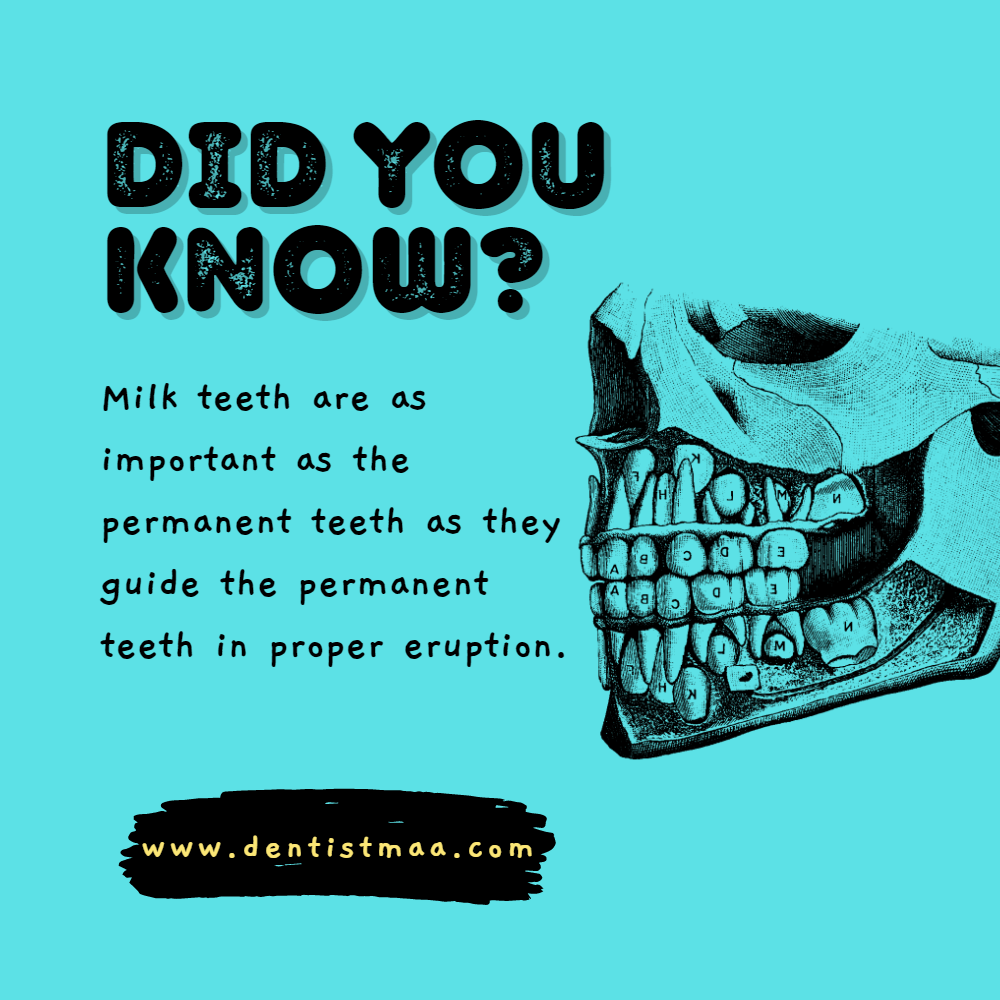
Many have a notion that milk teeth are not very important, and they are, anyway, going to be replaced by permanent teeth. But again, this is not true, as milk teeth have a purpose.
- They help in chewing.
- They help give the child a beautiful smile and, therefore, confidence.
- They act as space maintainers before the eruption of the permanent teeth.
- They help the child to speak properly (clarity of words).
So, the milk teeth have their purpose, and it should not be ignored.
3. Some kids are born with 2 lower milk teeth
Some kids are born with a set of lower front teeth (natal teeth). Most of the time, these are the milk teeth and if extracted, will not be replaced until the age of 6 years by the permanent teeth. These teeth might be loose and need extraction after birth. It is okay to get them extracted if they are loose or hindering breastfeeding, or the child is in trouble because of the teeth.
4. It is not okay if the milk teeth have cavities
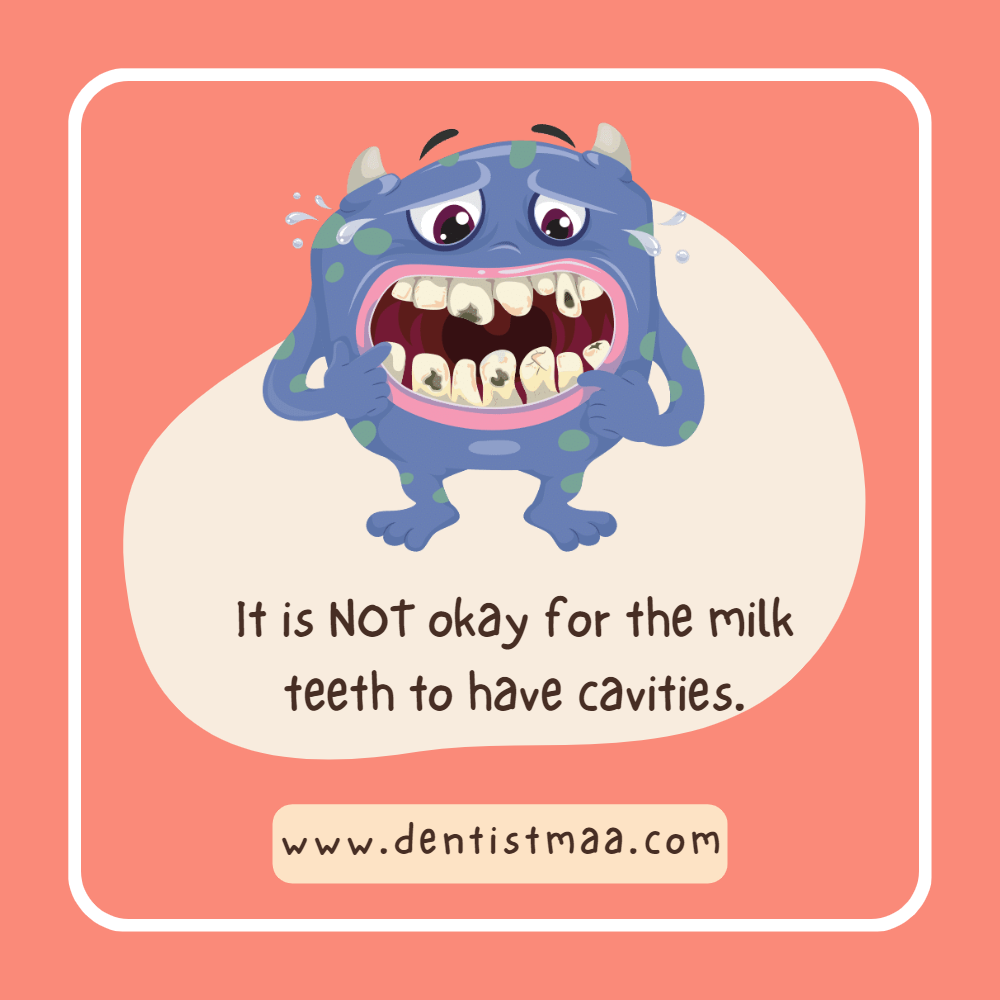
Yes, it is not okay if the milk teeth have cavities. Milk teeth will be replaced by permanent teeth, but all the permanent teeth, except the third molars (wisdom teeth), will erupt by the age of 12 years. And the milk teeth need to be preserved till the age of 12 years. They act as space maintainers for the permanent teeth, and also cavities can cause pain and discomfort to the child.
Many times, it is seen that the child is not eating well and is not gaining weight because the child is not able to chew the food properly. Healthy teeth help in gaining proper nutrition. If the child eats well, the child will be more active and attentive.
So, cavities in the milk teeth are a big no. Visit a dentist every 6 months for a routine dental examination for your child. Any cavity present can be detected early and filled. The first dental visit of the child is mandatory by the child’s first birthday or 6 months after the eruption of the first tooth, whichever is earlier.
Related: Why Does My Kid Have Discolored Teeth?
5. When do milk teeth start erupting?
Eruption of milk teeth can start any time between the age of 3 months to 18 months. Yes, sometimes the child might have delayed teething. If there are no teeth till the age of 18 months, then the best is to visit a pedodontist.
The child should get all the 20 teeth by the age of 3 years.
Related: Tooth Eruption Chart for Permanent Teeth
6. When do milk teeth start shedding?
Milk teeth start shedding between the ages of 6-7 years, but all the milk teeth are replaced by permanent teeth by the age of 11-12 years. So, preserving the milk teeth is very important.
Good oral hygiene should be maintained, and the parent or caregiver should brush the child’s teeth at least till the age of 6-7 years. After that also the child should be supervised by an adult while brushing.
7. How to deal with teething pain?
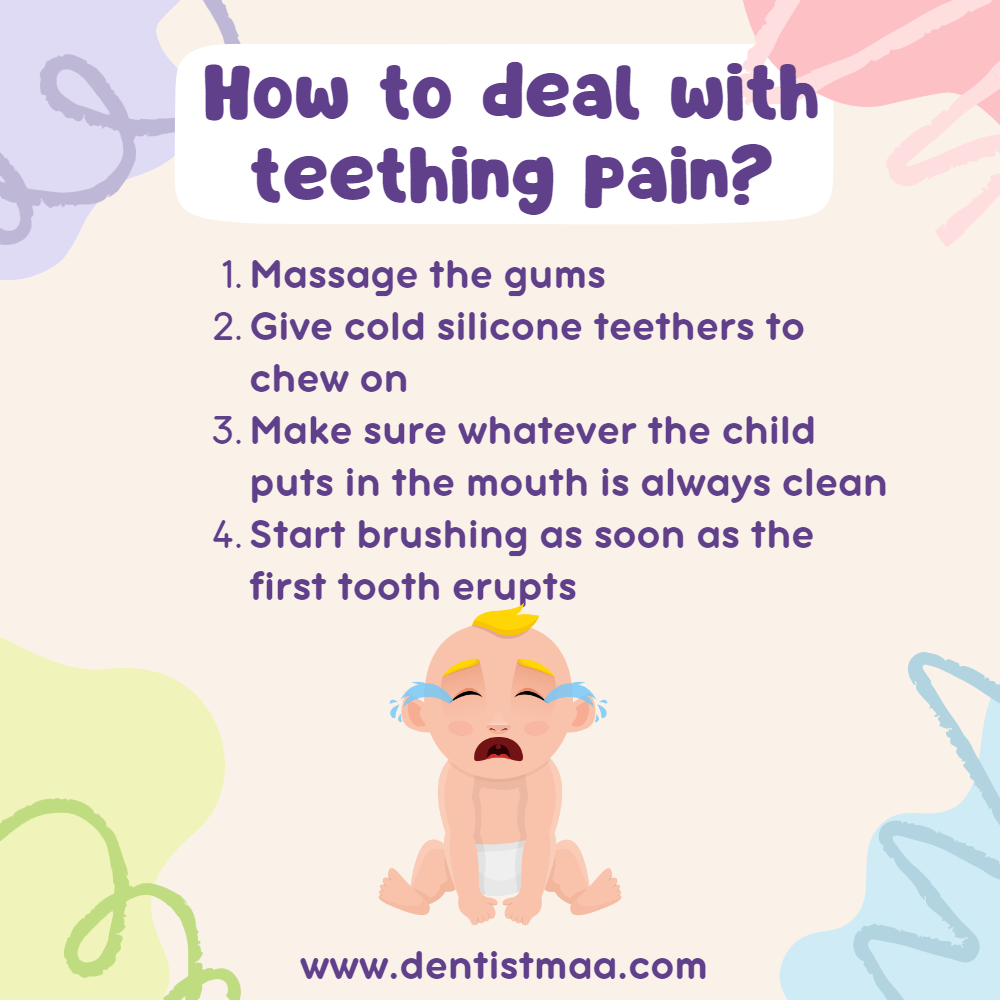
Some children have no problem at all during teething, and some have severe teething discomfort. You can do the following to comfort your child during teething.
- Massage the child’s gums using a clean, moist cotton cloth a few times a day.
- Give your child cold silicone teethers to chew on. You can keep the teether in the fridge for half an hour (not the freezer) and give it to your child.
- Make sure the child doesn’t put anything dirty (hands or toys) in the mouth, as that is the reason for stomach infection.
- Start brushing your child’s teeth using a silicone finger brush as soon as the child gets the first tooth. You can start using a grain size of kids’ age-appropriate fluoridated toothpaste.
It is a myth that teething causes high-grade fever. Teething only causes a degree rise in temperature and nothing more than that. If the child has a fever, please visit a paediatrician.
Tilasmi moti is regarded by many as a problem solver for teething pain, but that is not the case and according to the FDA teething jewellery should not be used. Here is a detailed article on why Tilasmi moti is a terrible idea.
Related: Grinding of Teeth in Toddlers
Like the other organs of the body, milk teeth are also very important, and are generally neglected. The parents or guardians should be aware of how to take care of the milk teeth of the child. Any concerns should be discussed with the dentist, and treatment initiated if required.
Disclaimer:
This blog provides general information about milk teeth. The opinions and content on this blog are only for conversational purposes and should not be interpreted as medical or dental advice about any particular individual. If the reader or any other person has a medical or dental concern, he or she should consult with an appropriate licensed medical or dental physician or a health care provider.
To book an Appointment with us visit: www.32sparklets.com

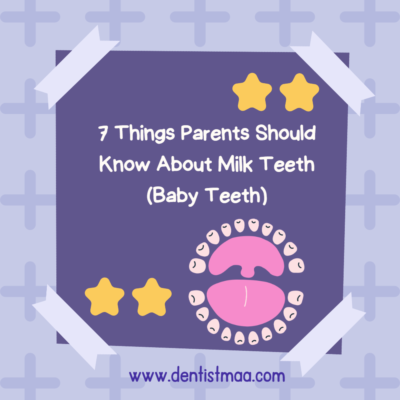
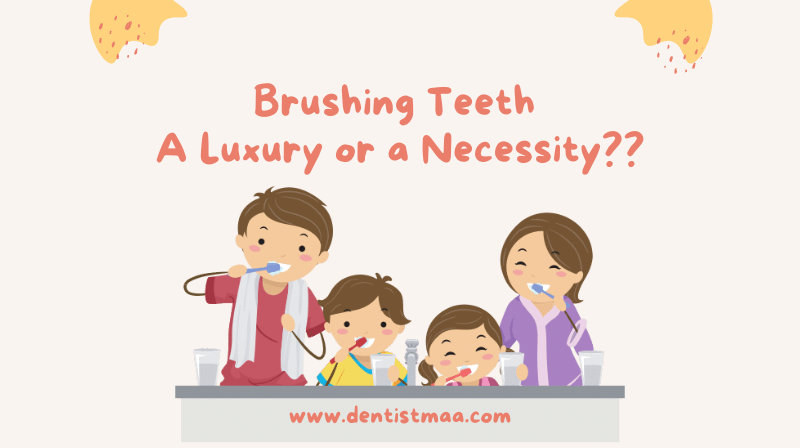
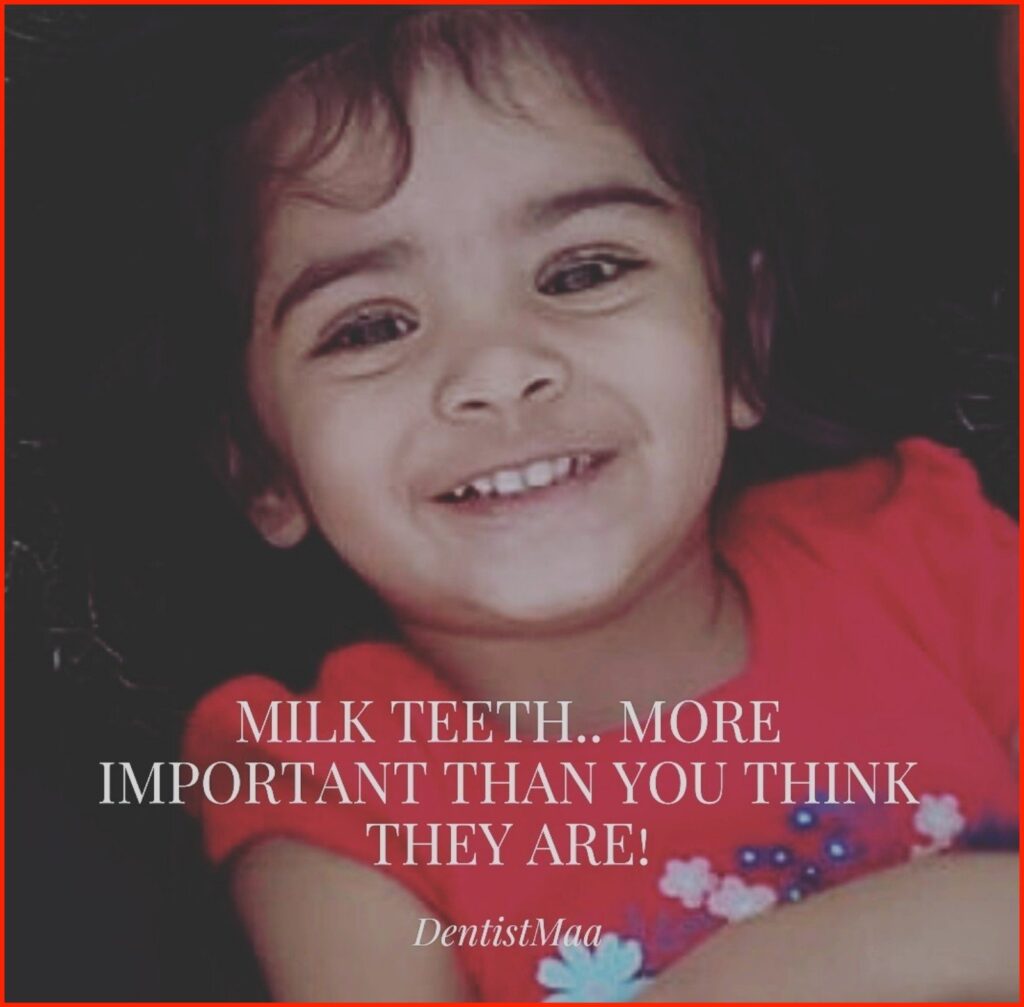
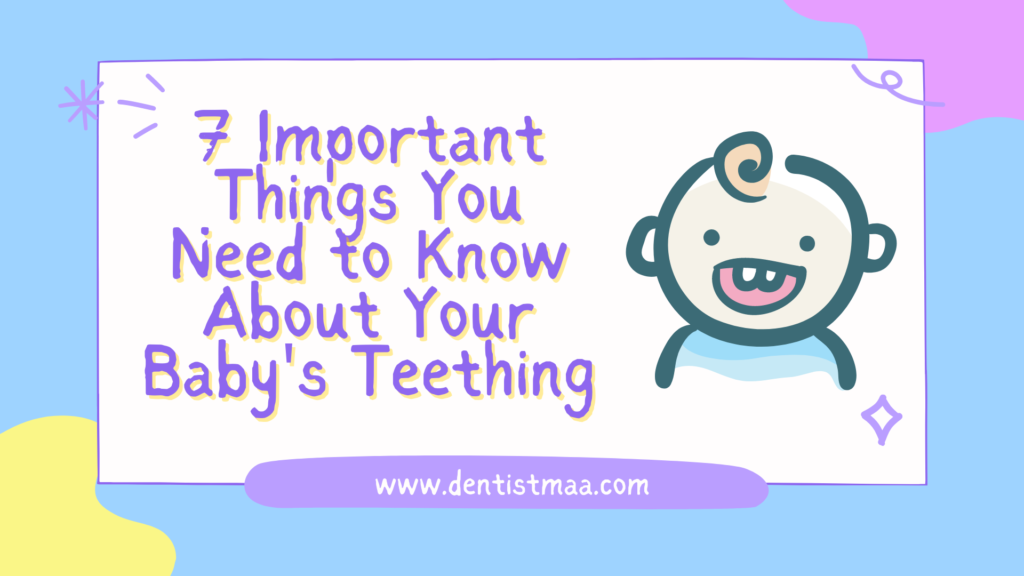
Pingback: What To Do If Your Child’s Loose Teeth Won’t Fall Out? - DentistMaa